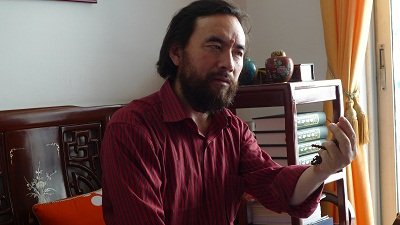
The Proof of Wisdom Is in Behavior
Xuemo
◎ A student of Shanghai University: You talked about Mahamudra culture and Liangzhou Xianxiao. They are very important throughout your writing career, including researches and accumulation of writing materials. How should we tap into these cultures? And how should we draw lessons from, say, Confucianism and Taoism? How should we absorb these cultures and put what we’ve learned into practice? How should we present Chinese culture in general and the culture of Western China in particular to the world?
●Xuemo: I tell you what, before you can absorb culture as you absorb nutrition, it remains knowledge, not wisdom. If you want to transform it into wisdom, you must assimilate it into your life and turn it into your behavior. Without behavior, there is no wisdom. Let’s put it another way. The beef in your mouth isn’t wisdom until it is swallowed into your stomach and turned into nutrition. If you keep it in your mouth and show it to your friends every now and then, it won’t become wisdom. Indeed, a lot of people are doing this: keeping a piece of beef in their mouth, showing it off now and then, and then putting it back. These people make a parade of their knowledge. Since they think of knowledge as something verbal and to be paraded, it will never become nutrition. Therefore, even if the meat is in their mouths, it has nothing to do with them. It’s just a piece of meat. Wisdom requires experiencing, or what we call wu – awakening and entering. We should enter into wisdom and understand it thoroughly, and use it to observe our behavior, so that it becomes a driving force for our behavior. No behavior, no wisdom. Wisdom is demonstrated entirely in one’s behavior. A wise man will never become so foolish as to compete with others. A man with wisdom never competes. He who sets himself against others surely has no wisdom, for his behavior betrays him. A wise person necessarily has wise behavior.
Therefore, the essence of Buddhism is not there to be learned and understood, but to be practiced. The name of Tao Xingzhi, a famous educator in modern China, indicates that he puts xing (doing) prior to zhi (knowing). In fact, his original name was Tao Zhixing – knowing before doing. He thought it should be the other way round, so he changed his name. You must learn to walk and turn wisdom into power and energy to support your walking. What you have learned is not yours, and will soon be forgotten, until it enters into your behavior. You need to turn the cultures of China, Western China, Buddhism, and Taoism into your light, into something of your own. Therefore, the important thing is to act, to do it, instead of talking.
Of course, there is a standard for behavior, that is, goodness. There must be a standard for truth, whether it is scientific truth, or religious truth, or theological truth, or any other truth – by the way, I think we should transcend name and form. What is the standard, then? Great goodness. It is a truth that benefits not only human beings, but animals and other creatures. Such a truth is worth believing in, yearning for, and promoting, even if it is theological truth. When Bruno was burnt to death and when Galileo was kept as a prisoner, both in the name of “theological truth,” such a truth was evil. When scientific truth is used to develop A-bombs and threaten to destroy mankind, such a truth is also evil. Therefore, there is no absolute truth. There is no theological truth nor any other truth with a different name or form. There is only one real truth, goodness, which is beneficial to all human beings, to all animals, and to all other creatures.
Notice
Translated by non-professional volunteers, there would be some inaccuracies in the translation. You are welcome to offer us some advice for emendation. Please feel free to contact us.We also look forward to you joining our voluntary translation team.
Please contact us at suonanzhuoma1988@163.com, thank you.
智慧的标志是行为
雪漠
◎上海大学学生问:您讲到的大手印文化、凉州贤孝。它们在您的整个写作生涯中、研究中、素材的积累中都起了非常重要的作用。您觉得怎样去挖掘这些文化?怎样去借鉴,比如儒家文化、道家文化。怎样去把这些文化吸收、借鉴、运用?怎样把中国文化、西部文化向世界展现出来?
●雪漠:我告诉大家,所有的文化在没有变成你的营养之前,都是知识,不是智慧。如果要把它们变成智慧必须得让它们消化到你的生命中,变成你的行为。没有这个行为构不成智慧。换一句话说,把那块牛肉吃到肚子里化成你的营养的时候,才成为智慧。含到嘴里时不时地吐出来让你的朋友看看你的牛肉,这不是智慧。好多人实质上就是含了一块牛肉,时不时拿出来再含到嘴里。卖弄知识的人都是这样的。实际上你把知识变成口头的东西,卖弄、卖弄,它们永远不会变成你的营养。没有变成营养的时候,那个东西跟你没有关系,只是一块肉而已。哪怕你含到嘴里跟你也没有关系。不是你经常在口头上卖弄就是你的东西了,不是这样。这需要体验,我们叫悟,悟进去,把这种智慧悟透,并用这种智慧观照自己的行为,让它成为你行为的一种力量。没有行为就没有智慧,所有的智慧都体现在你的行为上。不能说一个非常有智慧的人会愚蠢地和身边的人斗来斗去,真正有智慧的人是不会斗的。跟身边的人叫劲的人肯定没有智慧,因为斗的这种行为就代表了他没有智慧。有智慧的人必须有他智慧的行为。
所以佛教文化的精髓,不是让你去理解而是让你去做、行。陶行知,就是行而后知。他原来叫陶知行,知道了再去做。后来,他觉得应该反过来,才改了名。你必须学会走路,把这种智慧变成你走路的动力和能量。现在你所有学的东西还没有进入你的行为的时候,它不是你的东西,你很快就忘了。要把中国文化、西部文化、佛家文化、道家文化等所有的文化变成自己的光明,这个东西才属于你自己。所以,重要的是去做、行动,而不是说。
当然,那行为还有一个标准:善。无论科学真理也罢,宗教神学真理也罢,各种真理也罢。我觉得我们要超越这些名相。不管它是什么真理,要有一个标准。什么标准?大善。什么叫大善?只要它对人类以及人类之外的动物、生物有好处的时候,这个真理我们就信仰它、向往它、弘扬它。哪怕它是一种神学真理。当所谓的“神学真理”烧死了布鲁诺、囚禁了伽利略的时候,这种“神学真理”就是罪恶。当人们用“科学真理”造出原子弹,想毁灭人类的时候,这种真理也是罪恶。所以,没有什么绝对的真理,没有什么宗教神学这些乱七八糟名相的分别的真理。真正的真理只有一个——善,就是对所有的人类和动物、生物有好处。
声明:本文系文化志愿者试译,非专业人才翻译,错误定然不少,如出现疏漏及错误,敬请读者见谅。如有任何翻译上的建议及修正意见,欢迎及时与我们取得联系,我们会加以校对、修改,并希望有专业才能的朋友也能加入我们志愿者群体中来。
邮箱地址:suonanzhuoma1988@163.com
